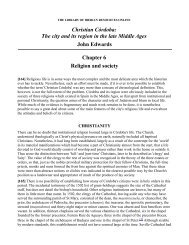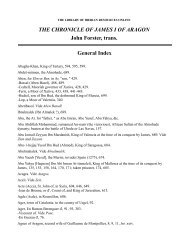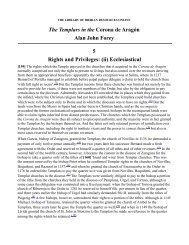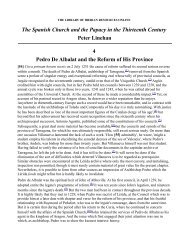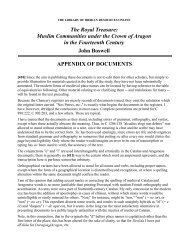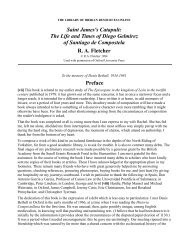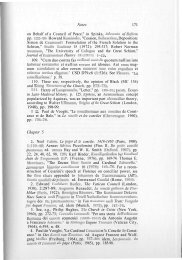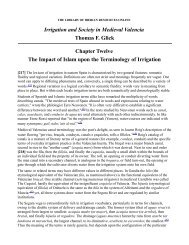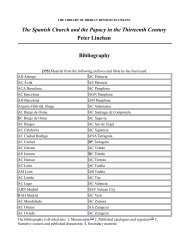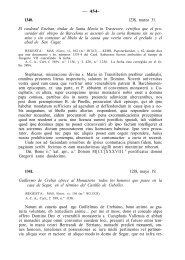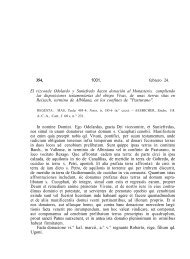PROTESTANTISM - The Library of Iberian Resources Online
PROTESTANTISM - The Library of Iberian Resources Online
PROTESTANTISM - The Library of Iberian Resources Online
You also want an ePaper? Increase the reach of your titles
YUMPU automatically turns print PDFs into web optimized ePapers that Google loves.
If this was the case in regard to nations presumably Catholic, we can readily conceive how much<br />
greater vigilance was exercised towards those which had lapsed into heresy. Commercial intercourse<br />
with them was unavoidable, but it was a necessary evil, to be restricted within the narrowest limits by<br />
deterrent regulations. For awhile, indeed, the heretic trader took his life and fortune in his hands when<br />
he ventured to make a Spanish harbor, as we have seen in the case <strong>of</strong> the good ship Angel. Even<br />
castaways were the legitimate prey <strong>of</strong> the Inquisition, as was experienced by seventeen English sailors<br />
<strong>of</strong> a fishing-boat, who were captured by a French vessel and were thrown on shore on Fuerte Ventura,<br />
one <strong>of</strong> the Canaries. <strong>The</strong>y were tried and escaped burning by conversion, after which four <strong>of</strong> them,<br />
Richard Newman, Edward Stephens, John Ware, and Edward Stride managed to escape. As this showed<br />
them to be impenitent, they were prosecuted in absentia for relapse, and their effigies were solemnly<br />
burnt in an auto <strong>of</strong> July 22, 1587. (120) <strong>The</strong> number <strong>of</strong> merchant vessels touching at the Canaries, in<br />
fact, furnished to the tribunal at one time the major portion <strong>of</strong> its work. A record <strong>of</strong> prisoners entered in<br />
its secret prison, during six months <strong>of</strong> 1593, shows thirteen belonging to the German ship San Pedro,<br />
seventeen to the Flemish ship La Rosa, and fifteen to the Flemish ship El Leon Colorado, besides a<br />
dozen English sailors whose vessel is not specified. <strong>The</strong>se comprise all hands, <strong>of</strong>ficers and crews,<br />
merchants and passengers, and presumably, if the cargoes were not confiscated, they were effectually<br />
looted in the absence <strong>of</strong> their guardians. (121) That such was the motive, rather than the protection <strong>of</strong><br />
Spain from the infection <strong>of</strong> heresy, is inferable from a sentence <strong>of</strong> the Granada tribunal, in 1574,<br />
condemning to reconciliation and life-long galley-service Jean Moreno, a Frenchman, resident in<br />
Málaga, because he had warned some Protestant sailors not to enter the port <strong>of</strong> Almería. (122) When<br />
there was prospect [463] <strong>of</strong> a fat confiscation, indeed, the Inquisition paid little respect to the justice <strong>of</strong><br />
the case or to the parties who might suffer. <strong>The</strong>re was a long dispute between Rome and Madrid over<br />
two cargoes <strong>of</strong> alum, which the papal camera was sending to England, when the ships were seized and<br />
the cargoes sequestrated by the tribunal <strong>of</strong> Seville, on the ground that the English crews were heretics.<br />
(123)<br />
This barbarous policy necessarily made itself felt in the cost <strong>of</strong> foreign commodities, especially after<br />
the troubles in the Netherlands had cut <strong>of</strong>f or reduced that portion <strong>of</strong> the carrying trade. Under this<br />
pressure, in 1597, an exception was made in favor <strong>of</strong> the Hansa. Instructions were issued by the<br />
Suprema that, when its ships arrived with merchandise, the persons in them were not to be interrogated<br />
about their religion, nor on that account were the ships or cargoes to be sequestrated or confiscated,<br />
unless while in port they had <strong>of</strong>fended against the Catholic faith and, in such case, only the property <strong>of</strong><br />
delinquents was to be seized; search, however, for prohibited books was to be made, as was customary<br />
with Catholic vessels. (124) <strong>The</strong>re was also an approach to admitting the Dutch, in a royal order <strong>of</strong><br />
February 27, 1603, providing that Holland vessels and crews, bearing passports from the Archdukes <strong>of</strong><br />
the Netherlands, were to be allowed entrance to Spanish ports, and their persons and property were to<br />
be secure, but this was revoked, December 11, 1604, subject to the twelve months' notice provided in<br />
the order. (125)<br />
A treaty <strong>of</strong> peace with England, covering this matter, was ratified by James I, August 29/19, 1604 and<br />
by Philip III, June 16, 1605. During this interval, in November, 1604, an English ship, with a crew <strong>of</strong><br />
twenty men, coming for a load <strong>of</strong> corn, touched at Messina and then at Palermo. In the latter port it was<br />
visited by the <strong>of</strong>ficials <strong>of</strong> the Inquisition, when the men admitted that they were Protestants and wished<br />
to live in that faith. <strong>The</strong>y were all arrested and appealed to the viceroy, the Duke <strong>of</strong> Feria. He was<br />
powerless save to write a private letter in which he declared that the arrest was a disservice to the king<br />
and tended to destroy the treaty agreed upon, wherefore the Inquisition ought to dissemble [464] and<br />
treat the heretics well, for the public good. <strong>The</strong> inquisitors thereupon assembled ten consultora,<br />
reaching the conclusion that the Englishmen could be liberated only on condition <strong>of</strong> giving ample<br />
security that they would go to Spain and present themselves before the inquisitor-general. For strangers



